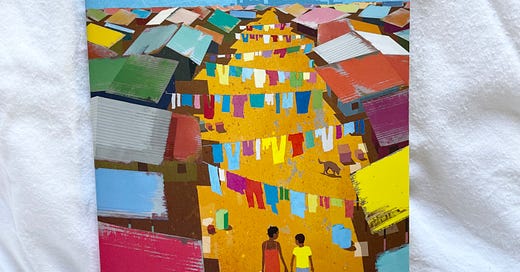44. Journey to Jo'burg | Beverley Naidoo
There is a small wire shelf in my local bookshop, set aside from the other main shelves and it holds about 6 or 7 books at any given time. There’s no real theme to the books that go on this shelf but for some reason I tend to find my favourites there. This one I’ve written about before came from the Magic Shelf (as I’m calling her). I came across Beverley’s book there too.
Technically this is a children’s book but since I was born in South Africa, and grew up during apartheid, all books that cover the topic are important to me. Beverley Naidoo was born in South Africa during apartheid too, but I imagine her experiences of that time are violently different to my own (as a white child).
When it was first published, Journey to Jo'burg was the first children's book about the lives of black South Africans during apartheid1. The book was banned in South Africa until 1991.
The book is a fictional story of a Black South African family, Naledi; her brother Tiro; their baby sister Dineo and their Mom, who works far away from the family’s home in Johannesburg.
“Can you imagine having to live apart from your parents for most of your childhood?
In South Africa for a long time the law forced many parents and children apart. Many mothers and fathers from the countryside had to go away to towns and cities to work. Their children had to stay behind. For this was the land of apartheid - where the broken families were all black and the people who made the laws were white. We didn’t often hear about the children who were cut off from their parents.”
Naledi, Tiro and Dineo live with their Aunty Mmangwane in a rural village 300kms from Johannesburg. Dineo falls ill and the hospital is too far away for them to take her. No-one in the village has money to pay a doctor to visit them. Naledi decides that the only solution is to walk the 300kms and tell their mom. Set against the dangerous landscape of apartheid South Africa, Journey to Jo’burg is the inspiring story of two brave children who will do anything to save their sister.
“I was born and brought up in Johannesburg.' ‘Jo’burg’ for short. We did not live in a great pink house like the Madam in this book, but in a small flat. My strongest memory of my mother is of her tapping away at her typewriter. She wrote about the theatre and made radio programmes, and my dad was a music publisher who wrote musicals. We were all looked after by Mma Sebate, who was cook, cleaner and nanny. As a child I never questioned the fact that I called her by her first name, Mary, when all white adults had to be called Aunty, Uncle, Mr or Mrs. I never questioned that we called her by an English name when her first language was Tswana. I never questioned that her own children lived 150 miles away and that she only saw them when our family went on holiday.
One awful day, when I was about eleven, she received a telegram and collapsed in front of me. The telegram told her that two of her three young daughters (aged about three and five at the time) had died. They had caught diphtheria - a disease that I, as a white child, could not have caught. I had been vaccinated. Her children had not.”
Apartheid was a system of rule in a white supremacist South Africa. It’s an Afrikaans word that translates as ‘separateness’.




